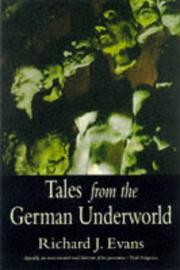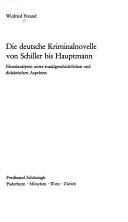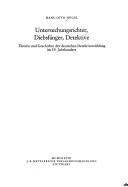| Listing 1 - 9 of 9 |
Sort by
|
Book
Year: 2017 Publisher: Göttingen : Universitätsverlag Göttingen,
Abstract | Keywords | Export | Availability | Bookmark
 Loading...
Loading...Choose an application
- Reference Manager
- EndNote
- RefWorks (Direct export to RefWorks)
By the 1920s and early 1930s the dime novel had already become well established as a medium for serial fiction and it developed innovative ways of shaping the temporality of literary communication: Recurring heroes made an appearance in more than one dime novel series at the same time, some even across media; publishers and writers found collective forms of text production not aiming to create one timeless work of art, but a continuous series of texts; readers learned to orient themselves with competing publishing schedules of different media and to comprehend the text world of a dime novel series by connecting a series of texts. The book deals with the question of how publishers, writers and readers shaped 'seriality' in the process of creating the fictional worlds of dime novels.
Book
ISBN: 3921499267 Year: 1979 Publisher: Erlangen
Abstract | Keywords | Export | Availability | Bookmark
 Loading...
Loading...Choose an application
- Reference Manager
- EndNote
- RefWorks (Direct export to RefWorks)
Detective and mystery stories, German --- German detective stories --- German mystery stories --- German fiction --- German literature
Book
ISBN: 082041106X Year: 1989 Publisher: Bern Lang
Abstract | Keywords | Export | Availability | Bookmark
 Loading...
Loading...Choose an application
- Reference Manager
- EndNote
- RefWorks (Direct export to RefWorks)
Crime in literature --- Detective and mystery stories, German --- German fiction --- Murder in literature --- History and criticism
Book
Year: 2017 Publisher: Göttingen, Germany : Universitätsverlag Göttingen,
Abstract | Keywords | Export | Availability | Bookmark
 Loading...
Loading...Choose an application
- Reference Manager
- EndNote
- RefWorks (Direct export to RefWorks)
By the 1920s and early 1930s the dime novel had already become well established as a medium for serial fiction and it developed innovative ways of shaping the temporality of literary communication: Recurring heroes made an appearance in more than one dime novel series at the same time, some even across media; publishers and writers found collective forms of text production not aiming to create one timeless work of art, but a continuous series of texts; readers learned to orient themselves with competing publishing schedules of different media and to comprehend the text world of a dime novel series by connecting a series of texts. The book deals with the question of how publishers, writers and readers shaped ‚seriality‘ in the process of creating the fictional worlds of dime novels. In den 1920er und frühen 1930er Jahren waren Heftromanserien keine neuartige Erscheinung, zeigten aber eine bemerkenswerte Vielfalt und Innovation im Umgang mit der Zeitlichkeit literarischer Kommunikation: Wiederkehrende Serienfiguren verbanden mehrere gleichzeitig erscheinende Serien zu komplexen, teilweise transmedialen Serienverbünden; Autorinnen und Autoren entwickelten kollektive Schreibweisen, die nicht auf die Erschaffung eines überzeitlichen Werkes abzielten, sondern eine Textproduktion „in Serie“ ermöglichten; das Lesepublikum lernte, sich in der Fülle gleichzeitiger medialer Angebote zu orientieren und die Texte der Serien verstehend aufeinander zu beziehen. Die vorliegende Arbeit geht der Frage nach, wie die Beteiligten die Zeitlichkeit der literarischen Kommunikation als ‚Serialität‘ gestalteten und dabei die fiktiven Welten von „Frank Allan. Der Rächer der Enterbten“ oder „Tom Shark. Der König der Detektive“ erschufen.
German literature --- Detective and mystery stories, German. --- Detective and mystery stories --- Serialized fiction --- Fiction. --- History and criticism.

ISBN: 0300072244 Year: 1998 Publisher: New Haven (Conn.): Yale university
Abstract | Keywords | Export | Availability | Bookmark
 Loading...
Loading...Choose an application
- Reference Manager
- EndNote
- RefWorks (Direct export to RefWorks)
Detective and mystery stories [German] --- Detectiveverhalen [Duitse ] --- Roman policier allemand --- Crime --- Criminals --- Detective and mystery stories, German. --- History --- Detective and mystery stories, German --- German detective stories --- German mystery stories --- German fiction --- Crime and criminals --- Delinquents --- Offenders --- Persons --- Criminal justice, Administration of --- Criminology --- City crime --- Crimes --- Delinquency --- Felonies --- Misdemeanors --- Urban crime --- Social problems --- Criminal law --- Transgression (Ethics) --- Social aspects --- Germany --- 19th century

ISBN: 3506728164 Year: 1980 Publisher: Paderborn
Abstract | Keywords | Export | Availability | Bookmark
 Loading...
Loading...Choose an application
- Reference Manager
- EndNote
- RefWorks (Direct export to RefWorks)
German literature --- Fiction --- Detective and mystery stories, German --- Roman policier allemand --- German detective stories --- German mystery stories --- -German fiction --- -German detective stories --- History and criticism --- -German literature --- German fiction --- History and criticism. --- Roman allemand --- Histoire et critique --- -History and criticism

ISBN: 3476003833 Year: 1978 Publisher: Stuttgart
Abstract | Keywords | Export | Availability | Bookmark
 Loading...
Loading...Choose an application
- Reference Manager
- EndNote
- RefWorks (Direct export to RefWorks)
Detective and mystery stories, German --- German fiction --- 82-312.4 --- 82-312.4 Detectiveroman. Misdaadroman --- Detectiveroman. Misdaadroman --- German detective stories --- German mystery stories --- History and criticism --- Thematology --- German literature --- anno 1800-1899
Book
ISBN: 1782043292 1322094624 1571135936 Year: 2014 Publisher: Rochester, New York : Camden House,
Abstract | Keywords | Export | Availability | Bookmark
 Loading...
Loading...Choose an application
- Reference Manager
- EndNote
- RefWorks (Direct export to RefWorks)
The first broad treatment of German genre fiction, containing innovative new essays on a variety of genres and foregrounding concerns of gender, environmentalism, and memory. Some of the most exciting research and teaching in the field of German Studies is being done on "genre fiction," including detective fiction, science fiction, and what is often called "poplit," to name but a few. Such non-canonical literature has long been marginalized by the German tradition of Bildung and the disciplinary practice of German literary studies (Germanistik). Even today, when the examination of non-canonical texts is well established and uncontroversial in other academic contexts, such texts remain understudied in German. And yet, the trend toward "German Studies" and "cultural studies" approaches within the field has raised considerable interest in theanalysis of genre fiction, resulting in both a great deal of new scholarship and a range of new courses. This first broad treatment of German genre fiction brings together innovative new scholarship, foregrounding themes of gender, environmentalism, and memory. It is an ideal companion to research and teaching. Written in accessible English, it speaks to a wide variety of disciplines beyond German Studies. Contributors: Bruce B. Campbell, Ray Canoy, Kerry Dunne, Sonja Fritzsche, Maureen O. Gallagher, Adam R. King, Molly Knight, Vibeke RuÌtzou Petersen, Evan Torner, and Ailsa Wallace. Bruce B. Campbell is Associate Professor of German Studies at the College ofWilliam and Mary. Alison Guenther-Pal is Assistant Professor of German and Film Studies at Lawrence University. Vibeke RuÌtzou Petersen is Professor Emerita of Women's Studies at Drake University.
German fiction --- Fiction genres. --- Popular literature --- Detective and mystery stories, German --- History and criticism. --- German detective stories --- German mystery stories --- Genre fiction --- Genres, Fiction --- Fiction --- Literary form --- German literature --- German genre fiction. --- detective fiction. --- environmentalism. --- gender. --- memory. --- poplit. --- science fiction. --- Science fiction, German --- Dystopias in literature.
Book
ISBN: 1782043586 1322241945 1571135715 Year: 2014 Publisher: Rochester, New York : Camden House,
Abstract | Keywords | Export | Availability | Bookmark
 Loading...
Loading...Choose an application
- Reference Manager
- EndNote
- RefWorks (Direct export to RefWorks)
Although George Bernard Shaw quipped that "the Germans lack talent for two things: revolution and crime novels," there is a long tradition of German crime fiction; it simply hasn't aligned itself with international trends. Duringthe 1920s, German-language writers dispensed with the detective and focused instead on criminals, a trend that did not take hold in other countries until after 1945, by which time Germany had gone on to produce antidetective novels that were similarly ahead of their time. German crime fiction has thus always been a curious case; rather than follow the established rules of the genre, it has always been interested in examining, breaking, and ultimately rewriting those rules. This book assembles leading international scholars to examine today's German crime fiction. It features innovative scholarly work that matches the innovativeness of the genre, taking up the Regionalkrimi;crime fiction's reimagining and transforming of traditional identities; historical crime fiction that examines Germany's and Austria's conflicted twentieth-century past; and how the newly vibrant Austrian crime fiction ties in with and differentiates itself from its German counterpart. Contributors: Angelika Baier, Carol Anne Costabile-Heming, Kyle Frackman, Sascha Gerhards, Heike Henderson, Susanne C. Knittel, Anita McChesney, Traci S. O'Brien,Jon Sherman, Faye Stewart, Magdalena Waligórska. Lynn M. Kutch is Professor of German at Kutztown University of Pennsylvania. Todd Herzog is Professor and Head of the Department of German Studies at the University of Cincinnati.
Detective and mystery television programs --- Detective and mystery stories, German --- German fiction --- Austrian fiction --- Television crime shows --- Literature and history --- Identity (Psychology) in literature. --- History and criticism. --- History and literature --- History and poetry --- Poetry and history --- History --- Crime shows --- Crime television programs --- Criminal shows --- Criminal television programs --- Fiction television programs --- Thrillers (Television programs) --- Austrian literature --- German literature --- German detective stories --- German mystery stories --- Austrian authors --- Austrian crime fiction. --- Contemporary Crime Fiction. --- Crime Fiction. --- Crime Genre. --- Detective Fiction. --- German Authors. --- German Crime Novels. --- German Crime Writers. --- German Literature. --- German counterpart. --- German crime fiction. --- German-Language Crime Fiction. --- Literary Analysis. --- Literary Criticism. --- Literary Scholarship. --- Literary Tradition. --- Literary Trends. --- Regionalkrimi. --- historical crime fiction. --- traditional identities.
| Listing 1 - 9 of 9 |
Sort by
|

 Search
Search Feedback
Feedback About UniCat
About UniCat  Help
Help News
News